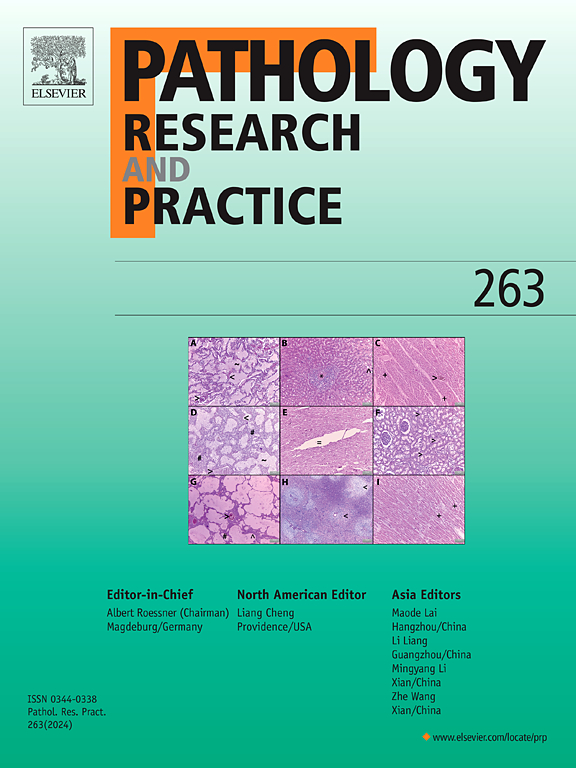STAT3-related lncRNAs in colorectal cancer progression; Special focus on immune cell’s evasion
IF 2.9
4区 医学
Q2 PATHOLOGY
引用次数: 0
Abstract
Colorectal cancer (CRC) is globally ranked as the third leading cause of cancer-related deaths in both men and women. There is an urgent need for novel biomarkers to facilitate early diagnosis and enhance patient care, thereby improving treatment response and reducing mortality rates. Signal transducer and activator of transcription 3 (STAT3) is essential for controlling the anti-tumor immune response since it is a hub for several oncogenic signaling pathways. In the tumor environment, STAT3 is widely overactivated in both malignant and non-cancerous cells. It is involved in suppressing the expression of critical immune activation regulators and encouraging the synthesis of immunosuppressive substances. Long noncoding RNAs (lncRNAs), a kind of non-coding RNA, are critical for CRC development, apoptosis, and metastasis because they influence important signaling pathways such as STAT3 signaling and contribute to gene regulation at the epigenetic, transcriptional, and post-transcriptional levels. Moreover, lncRNAs have a significant role in modifying the TME and control the expression of important immunological checkpoints, such as PD-L1. Therefore, a comprehensive understanding of the regulatory roles of lncRNAs is crucial for identifying diagnostic, prognostic, and predictive biomarkers for CRC. Thus, the objective of the present review study is to provide a comprehensive overview of the interaction between the STAT3 signaling pathway and various lncRNAs, as well as their implications for apoptosis, metastasis, and immune evasion in CRC.
stat3相关lncrna在结直肠癌进展中的作用特别关注免疫细胞的逃避。
结直肠癌(CRC)在全球范围内被列为男性和女性癌症相关死亡的第三大原因。迫切需要新的生物标志物来促进早期诊断和加强患者护理,从而提高治疗反应和降低死亡率。信号换能器和转录激活因子3 (STAT3)是控制抗肿瘤免疫反应所必需的,因为它是几个致癌信号通路的枢纽。在肿瘤环境中,STAT3在恶性和非癌细胞中都被广泛过度激活。它参与抑制关键免疫激活调节因子的表达和促进免疫抑制物质的合成。长链非编码RNA (lncRNAs)是一种非编码RNA,对结直肠癌的发生、凋亡和转移至关重要,因为它们影响STAT3信号等重要信号通路,并在表观遗传、转录和转录后水平上参与基因调控。此外,lncrna在修饰TME和控制重要免疫检查点(如PD-L1)的表达方面具有重要作用。因此,全面了解lncrna的调控作用对于确定CRC的诊断、预后和预测性生物标志物至关重要。因此,本综述的目的是全面概述STAT3信号通路与各种lncrna之间的相互作用,以及它们在结直肠癌中凋亡、转移和免疫逃避中的意义。
本文章由计算机程序翻译,如有差异,请以英文原文为准。
求助全文
约1分钟内获得全文
求助全文
来源期刊
CiteScore
5.00
自引率
3.60%
发文量
405
审稿时长
24 days
期刊介绍:
Pathology, Research and Practice provides accessible coverage of the most recent developments across the entire field of pathology: Reviews focus on recent progress in pathology, while Comments look at interesting current problems and at hypotheses for future developments in pathology. Original Papers present novel findings on all aspects of general, anatomic and molecular pathology. Rapid Communications inform readers on preliminary findings that may be relevant for further studies and need to be communicated quickly. Teaching Cases look at new aspects or special diagnostic problems of diseases and at case reports relevant for the pathologist''s practice.

 求助内容:
求助内容: 应助结果提醒方式:
应助结果提醒方式:


